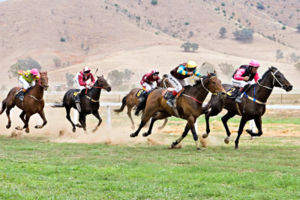
Sunday, October 25, 2009
Bryce Canyon
Bryce Canyon in the U.S. state of Utah, seen here from Bryce Point. Despite its name, this is not actually a canyon, but rather a giant natural amphitheater. Bryce is distinctive due to its unique geological structures, called "hoodoos", formed from wind, water, and ice erosion of the river and lakebed sedimentary rocks.


Sparrenburg Castle
Sparrenburg Castle, located in Bielefeld, Germany, as seen from the western lawn. The castle was constructed between 1240 and 1250 by the Counts of Ravensberg. The castle has been rebuilt many times. Although often under siege, it was never stormed. After extensive restoration work, the castle now presents itself as an imposing historic site.


Royal College of Music
United States Capitol
The western (front) side of the United States Capitol. The U.S. Capitol serves as the location for Congress, the legislative branch of the U.S. federal government. It is located in Washington, D.C., on top of Capitol Hill at the east end of the National Mall. The building is marked by its central dome above a rotunda and two wings. It is an exemplar of the Neoclassical architecture style.
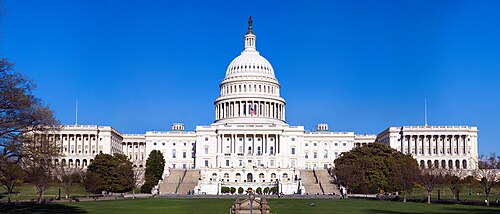

Broadway Tower
Broadway Tower is a folly located near the village of Broadway, Worcestershire, England, at one of the highest points of the Cotswolds. Its base is 1,024 feet (312 metres) above sea level, the tower itself standing 55 feet (17 metres) tall. On a clear day, thirteen counties of England can be seen from its top.


Mont Saint-Michel
Mont Saint-Michel and its abbey at night. This UNESCO World Heritage Site is a rocky tidal island roughly one kilometre from the north coast of Normandy, France at the mouth of the Couesnon River, near Avranches. Mont Saint-Michel was previously connected to the mainland via a thin natural land bridge, which before modernization was covered at high tide and revealed at low tide.


Saturday, October 24, 2009
Cleveland Tower
This watercolor painting shows Cleveland Tower on the campus of Princeton University in Princeton, New Jersey as seen from just outside Procter Hall at the Old Graduate College in the noon autumn sun. The tower was built in 1913 as a memorial to former United States President Grover Cleveland, who also served as a university trustee. One of the largest carillons in the world, the class of 1892 bells, was installed in 1927. The Chapel Music program plays the bells Sunday afternoons during each semester, except during exam periods.


Las Vegas Strip
A panorama of a portion of the Las Vegas Strip at night (facing east), as seen from the Bellagio. Despite the name, the majority of The Strip is not actually within the city limits of Las Vegas, Nevada. Visible in the image are (left to right) Bally's, Paris, Aladdin (now Planet Hollywood), MGM Grand, Monte Carlo, New York-New York, the Project CityCenter construction site, as well as a number of other smaller hotels and casinos.


Sather Tower
Sather Tower on the campus of the University of California, Berkeley, as seen from California Memorial Stadium at sunset. The campanile (bell and clock tower), home of a full concert 61-bell carillon, serves as the school's most recognizable symbol and has been a major point of orientation in almost every campus master plan. The tower has thirteen floors, with the observation deck on the eighth.
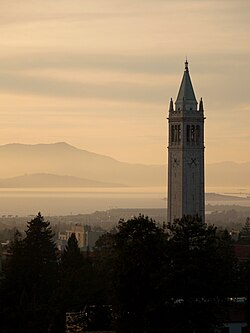

Earth's atmosphere
An image of the top layers of Earth's atmosphere leading to outer space. Atmospheric gases scatter blue wavelengths of visible light more than other wavelengths, giving the Earth’s visible edge a blue halo. At higher and higher altitudes, the atmosphere becomes so thin that it essentially ceases to exist. Gradually, the atmospheric halo fades into the blackness of space
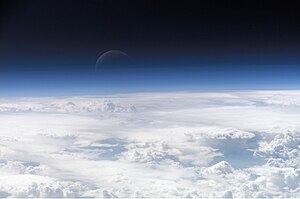

Vernal Fall
Vernal Fall is a 317 ft (97 m) tall waterfall on the Merced River just downstream of Nevada Fall in Yosemite National Park, California, USA. It is accessible via the Mist Trail, which climbs close enough to the fall so that hikers must travel through the fall's mist. The waterfall runs all year long, although by the end of summer, it is substantially reduced in volume and can split into multiple strands, rather than a single curtain, of water.


Second Severn Crossing
A view of the Second Severn Crossing, as seen from Severn Beach, England. This bridge carries the M4 motorway across the River Severn between Severn Beach and Caldicot in south Wales. It has a total span of 5.1 km and includes a cable-stayed section called the Shoots Bridge which spans the shipping channel between the two towers. The River Severn has a vast tidal range—the point from which this photograph was taken is covered at high tide.


Magnificent Hummingbird
The Magnificent Hummingbird (Eugenes fulgens, female shown here) is a large hummingbird that breeds in mountains from the southwestern United States to western Panama. The bird appears very dark unless the sun catches the iridescence of the plumage and the brilliant colours flash in the sunlight. It is generally about 13 cm long, with males weighing 10 g and females 8.5 g. The black bill is long and slightly curved.
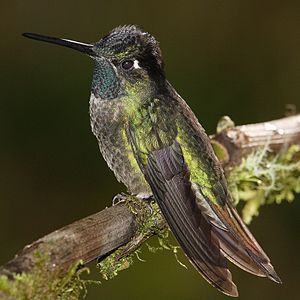

Peugeot 206 Swedish Rally
Sunday, October 4, 2009
Toledo, Spain
The skyline of Toledo, Spain, at sunset, with the Alcázar on the left and Cathedral on the right. The city, a UNESCO World Heritage Site, is the capital of the province of Toledo and of the autonomous community of Castile-La Mancha. It is one of the former capitals of the Spanish Empire and a place of coexistence of Christian, Jewish and Moorish cultures.


Montserrat
Alcatraz Island
Morteratsch glacier
A stitched panorama of the Morteratsch Glacier, the largest glacier by area in the Bernina Range, Switzerland. By volume, it is the largest glacier in the Eastern Alps. In spring, depending on the snow conditions, a 10 km (6.25 mi) long ski-run is marked on the glacier, which takes up to two hours to descend.


L'Hemisferic
Striated Pardalote
An Eastern Striated Pardalote (Pardalotus striatus ornatus) with nesting material in its mouth. This subspecies of the Striated Pardalote, the least colourful and most common of the four pardalote species, is found in subtropical areas of Eastern Australia. They are more often heard than seen, foraging noisily for lerps and other small creatures in the treetops.
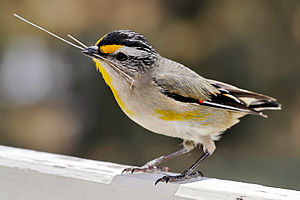

Friday, October 2, 2009
Male mallard in mid-flight
A male Mallard in mid-flight. The fundamentals of bird flight are similar to those of aircraft. Lift force is produced by the action of air-flow on the wing, which is an airfoil. This occurs because the air has a lower air pressure just above the wing and higher pressure below. When a bird flaps its wings they continue to develop lift but they also create an additional forward and upward force, thrust, to counteract its weight and drag.


US Capitol Building
The United States Capitol at night. The U.S. Capitol serves as the location for Congress, the legislative branch of the U.S. federal government. It is located in Washington, D.C., on top of Capitol Hill at the east end of the National Mall. The building is marked by its central dome above a rotunda and two wings. It is an exemplar of the Neoclassical architecture style.


Monday, September 28, 2009
Cheetah
The Cheetah (Acinonyx jubatus) is an atypical member of the cat family that hunts by speed rather than by stealth or pack tactics. It is the fastest of all land animals and can reach speeds of up to 70 mph (120 km/h) in short bursts up to 500 yards (500 m). The cheetah is well known for its amazing acceleration (0 to 100 km/h (~62 mph) in 3.5 seconds which is faster than the Mercedes-Benz SLR McLaren, the Lamborghini Murciélago and the F/A-18 Hornet).


Matterhorn
The eastern face of the Matterhorn, reflected in the Riffelsee. Perhaps the most familiar mountain in the European Alps, the Matterhorn sits on the border between Switzerland and Italy. The peak has four faces, facing the four compass points, with the north and south faces meeting to form a short east-west summit ridge. Despite its prominence in a general sense, the Matterhorn is not among the top 100 mountains in the Alps measured by topographic prominence. Several of its close neighbors, including Monte Rosa, the Dom, Liskamm and the Weisshorn, have higher summits.


Dingle Peninsula, County Kerry, Ireland
Panoramic view of the Dingle Peninsula, the westernmost point of the Republic of Ireland. The peninsula is named after the town of Dingle and is the location of numerous prehistoric and early medieval remains, for example the Gallarus Oratory in the very west of the peninsula near the village of Baile an Fheirtéaraigh in Ard na Caithne.


Interior of the Panthéon, Paris
Panoramic shot of the interior of the Panthéon, a church and burial place located in the Latin Quarter of Paris, France. Originally built as a church dedicated to St. Genevieve, the National Convention ordered it to be changed from a church to a mausoleum for the interment of great Frenchmen. Among those buried in its necropolis are Voltaire, Rousseau, Marat, Victor Hugo, Émile Zola, Jean Moulin, Marie Curie, and Louis Braille.
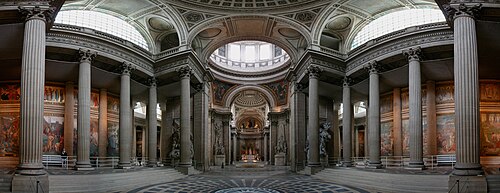

Amur Tiger
Tower Bridge, Sacramento, California, USA
An HDR image of Tower Bridge at twilight crossing the Sacramento River in Sacramento, California. Completed in 1935, this was the first vertical lift bridge in the California Highway System. It is 52 feet (15.8 m) wide, 737 feet (223.3 m) long, and 160 feet (48.5 m) tall. There are four lanes for cars, and one large center lane for a railroad.


Cave paintings, Ajanta Caves, India
Sixth century mural from the wall of the Ajanta Caves, Maharashtra, India, painted during the Gupta Empire. These paintings, like many produced in this time period, freely depict nudity, romantic themes or sexual situations, reflecting the lack of taboos against sex in a society that also produced the Kama Sutra and the Tantric school of Indian philosophy.


2006 Tambo Valley Races, Swifts Creek, Victoria, Australia
Hacha Grande, Lanzarote, Canary Islands
Chapel, Palace of Versailles
The chapel of the Palace of Versailles, one of the palace's grandest interiors. Located in Versailles, France, Versailles is famous not only as a building, but as a symbol of the system of absolute monarchy which Louis XIV espoused. Originally the royal hunting lodge when he decided to move there in 1660, the building was expanded over the next few decades to become the largest palace in Europe. Louis XIV officially moved in 1682 and the Court of Versailles was the centre of power in Ancien Régime France until the royal family was forced to return to the capital in 1789.


Porto, Portugal
Cumulonimbus capillatus incus cloud floating over Swifts Creek, Victoria in Australia
Salzburg, Austria
Panoramic view of the old town of Salzburg, Austria over the River Salzach as viewed from the Festung or Hohensalzburg Fortress. The birthplace of Mozart, Salzburg lies at the northern boundary of the Alps and was the setting for the film The Sound of Music, which was based on the life of Salzburg resident Maria von Trapp. The city has a long history, with traces of human settlements dating back to the Neolithic Age. Today, it is a popular tourist spot, especially for skiers in the winter.


Melbourne Docklands, Australia
A panorama of the Melbourne skyline and parts of the Melbourne Docklands from Yarra's Edge at twilight. The Docklands is an urban redevelopment project which will nearly double the size of the city's central business district when completed in 2015. The suburb is expected to become home to 20,000 people by completion, as well as a workplace for 25,000. The estimated number of visitors per day will be 55,000 (over 20 million a year).


Interior of Old Saint Paul's, Wellington, New Zealand
Old Saint Paul's in Wellington, New Zealand, is an example of 19th-century Gothic Revival architecture adapted to colonial conditions and materials. It is constructed entirely from New Zealand native timbers. While no longer a parish church, it remains consecrated, and is a popular venue for weddings, funerals and other services. This photo of the nave is an example of high dynamic range imaging.


Lower Manhattan skyline
Lower Manhattan (seen here from the Staten Island Ferry) is the southernmost part of the island of Manhattan, the main island and center of business and government of the City of New York. Lower Manhattan includes City Hall, the Municipal Building, the Financial District and the site of the World Trade Center. This area is also the earliest settled (by Europeans) area, and is one of the few areas of Manhattan that does not have its streets arranged in a strict grid pattern.


Abbey spire, Mont Saint Michel, France
Mont Saint Michel, a small rocky tidal island in Normandy, is famous for its Benedictine abbey (spire pictured here) and steepled church (built between the 11th and 16th centuries) which occupy most of the island. The abbey was constructed in the 11th century, but by the time of the French Revolution its popularity had waned to the point where there were scarcely any monks in residence and it was converted to a prison. However, in 1874 it was declared a national monument and is on the list of UNESCO World Heritage Sites.


Prothonotary Warbler
The Prothonotary Warbler is a small songbird of the New World warbler family. It breeds in hardwood swamps in southern Canada and the eastern United States, nesting in a cavity. The male often builds several incomplete unused nests in his territory; the female builds the real nest. It winters in the West Indies, Central America and northern South America. This bird was named after officials in the Roman Catholic Church known as the protonotarii, who wore golden robes.
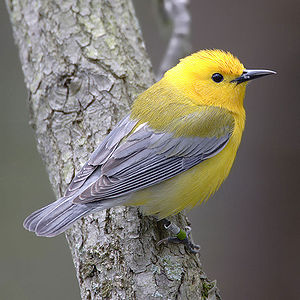

Nilov Monastery on Stolobnyi Island in Lake Seliger in Tver Province, Russia
This photo of the Nilov Monastery on Stolbnyi Island in Tver Oblast, Russia, was taken by Sergei Mikhailovich Prokudin-Gorskii in 1910 before the advent of colour photography. His process used a camera that took a series of monochrome pictures in rapid sequence, each through a different coloured filter. By projecting all three monochrome pictures using correctly-coloured light, it was possible to reconstruct the original colour scene.


Tulips
There about 100 species of tulip, native to southern Europe, north Africa, and Asia. They are perennial bulbous plants growing to 10-70 cm tall with large flowers with six tepals. Besides being the national flower of Iran and Turkey, tulips are closely associated with the Netherlands, so much so that the term "Dutch tulips" is often used for the cultivated forms.


Salad platter
A salad platter, consisting of bread, lettuce, spring onions, cucumber, feta cheese, sun-dried tomatoes, beetroot, cherry tomatoes, olives, and dressing. "Salad" is actually a broad term applied to many food preparations that are a mixture of chopped or sliced ingredients. A salad can be served cold or at room temperature, though it also can form the filling for a hot sandwich. While it can be made with meat or eggs, it usually includes at least one raw vegetable or fruit.


Château de Chambord, France
With its very distinct Renaissance architecture, the Château de Chambord in Chambord, Loir-et-Cher, France, is one of the most recognizable châteaux in the world. The massive castle, originally built as a hunting lodge for King François I, features 440 rooms, 365 fireplaces, and 84 staircases. The château was never intended to provide any form of defence from imagined enemies. As such, the walls, towers and partial moat are purely decorative.
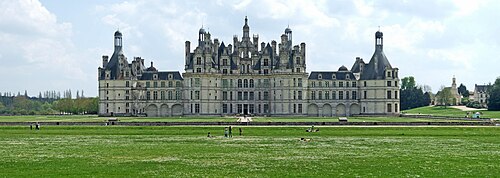

Fortified city of Carcassonne, France
Fortified city of Carcassonne, France, and the Pont Vieux crossing the Aude river
Panorama of the fortified city of Carcassonne (Aude, France) and the Pont Vieux crossing the Aude River. The fortress of Carcassonne was considered impregnable and never conquered. It was begun by the Romans and built up through the years. It fell into disrepair was restored in the 19th century. It is now a UNESCO World Heritage Site.

Panorama of the fortified city of Carcassonne (Aude, France) and the Pont Vieux crossing the Aude River. The fortress of Carcassonne was considered impregnable and never conquered. It was begun by the Romans and built up through the years. It fell into disrepair was restored in the 19th century. It is now a UNESCO World Heritage Site.

Graz, Austria, City Hall
The Rathaus or City Hall of Graz, the second-largest city in Austria after Vienna, at dusk. Graz was the 2003 European Capital of Culture and its "Old Town" is included in the UNESCO list of World Cultural Heritage Sites. Occupying a strategic location, Graz began as Roman fort and survived numerous assaults over the centuries.


Great Dividing Range, Australia
A panorama of Australia's most substantial mountain range, the Great Dividing Range, which stretches from the northeastern tip of Queensland to the Grampians in western Victoria and divides the watersheds of streams and rivers which flow directly into the Pacific Ocean on the eastern coast of Australia, from those of the Murray-Darling Basin which flow away from the coast into the interior plains.


Millenium Wheel or the London Eye, viewed from the rear
Seen here from the rear at twilight, the London Eye, also known as the Millennium Wheel, is the largest observation wheel (a type of Ferris wheel) in the world at 135 m (443 ft) high. The wheel carries 32 sealed passenger capsules and rotates at a rate of 0.26 m/s (about 0.9 km/h or 0.6 mph) so that one revolution takes about 30 minutes to complete.
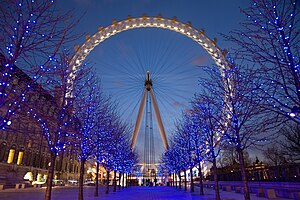

Subscribe to:
Comments (Atom)







